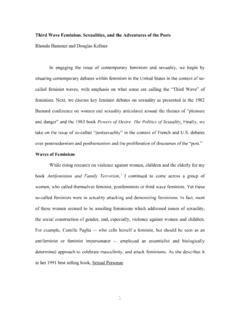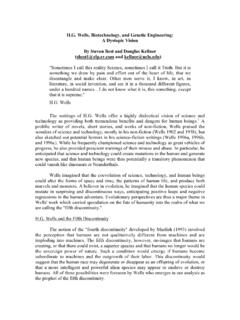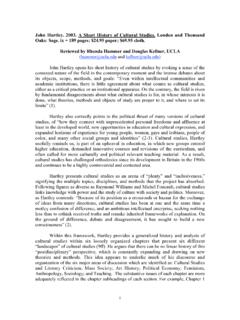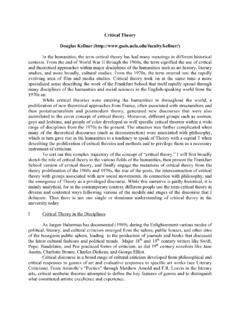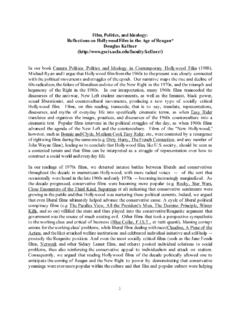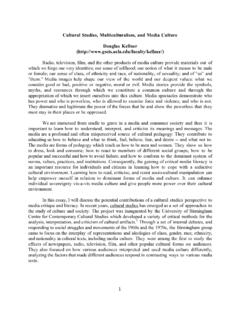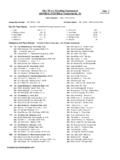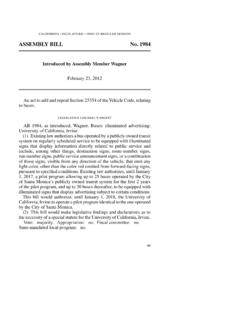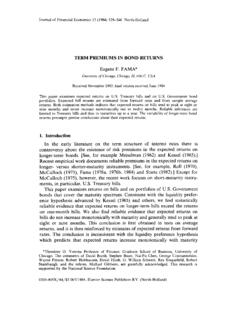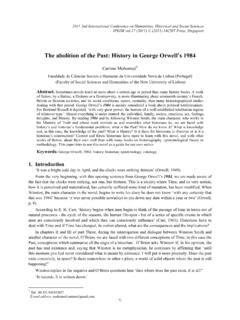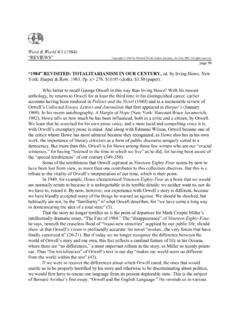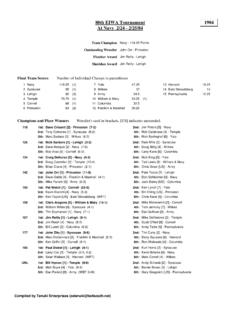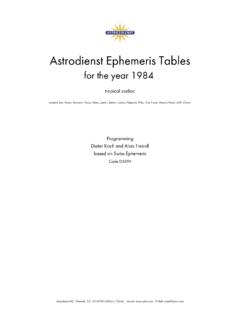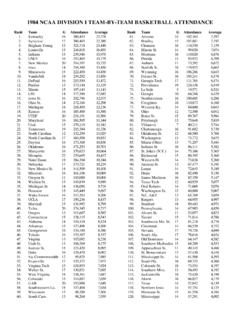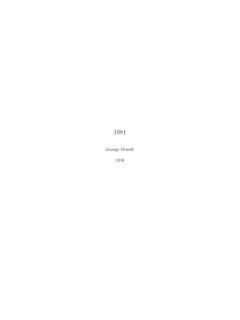Transcription of From 1984 to One-Dimensional Man: Critical Reflections on ...
1 From 1984 to One-Dimensional Man: Critical Reflections on Orwell and MarcuseDouglas Kellner( )Occasionally literary and philosophical metaphors and images enter the domain of populardiscourse and consciousness. Images in Uncle Tom's Cabin of humane and oppressed blackscontrasted to inhumane slave owners and overseers shaped many people's negative images ofslavery. And in nineteenth century Russia, Chernyshevsky's novel What is to be Done? shaped ageneration of young Russian's views of oppressive features of their society, including Leninwho took the question posed by Chernyshevsky's novel as the title of one of his earlyrevolutionary treatises. In the twentieth century, George Orwell's vision of totalitarian society inhis novel 1984 has had a major impact on how many people see, understand, and talk aboutcontemporary social trends. {1} Subsequently, Herbert Marcuse's analyses and images of a " One-Dimensional man" in a " One-Dimensional society" shaped many young radicals' ways of seeingand experiencing life in advanced capitalist society during the 1960s and 1970s --though to amore limited extent and within more restricted circles than Orwell's writings which are amongthe most widely read and discussed works of the century.
2 There are, in fact, both some striking differences and similarities between the visions oftotalitarianism in contemporary industrial societies in the works of George Orwell and HerbertMarcuse. A contrast between Orwell and Marcuse seems useful at this point in time since theyboth offer insights that illuminate various features of the contemporary social and political the light of the growth of repressive governments of the communist, fascist, and democraticcapitalist systems in the contemporary epoch, it seems appropriate to re-read Orwell's novels andessays and Marcuse's writings since both contain concepts and analyses that provide sharpcritiques of the mechanisms and power in institutions which practice socio-political dominationand oppression. Moreover, both raise the question of the proper theoretical and political responsetoward current trends of social irrationality and domination, as well as the possibilities ofemancipation.
3 In this paper, I shall compare Orwell's and Marcuse's visions and critiques of totalitariansocieties with current features of contemporary societies -- capitalist, fascist, and statecommunist --, and shall re-appraise the politics and ideological effects of Orwell's and Marcuse'sthought. My arguments will suggest that political thinkers must be read historically andcontextually, and that it is problematical to apply texts intended to criticize conditions of oneepoch and society to another. Accordingly, I shall argue that Orwell's articles on totalitarianismand his widely discussed novel 1984 project an image of totalitarian societies whichconceptualizes his experiences of fascism and Stalinism and his fears that the trends toward thistype of totalitarianism would harden, intensify, and spread throughout the world. I shall refer to this vision of totalitarian domination as "Orwell's Nightmare." Against the manyrecent attempts to celebrate Orwell as a prophet who anticipated the fundamental trends ofcontemporary civilization, I shall argue that his vision of totalitarianism has limited applicationto neo-capitalist societies, and that the writings of Huxley and Marcuse provide more usefultheoretical and political perspectives on contemporary capitalist societies.
4 {2} Furthermore, Ishall argue that Orwell's perspectives on the state, bureaucracy, and power are highly flawed andthat the positions of Weber, Gramsci, and Foucault on these phenomena are , I shall carry through a rather systematic reappraisal of Orwell as a politicalthinker and prophet while attempting to delineate the contributions and limitations of his politicalwritings. Similarly, I shall interrogate the legacy of Herbert Marcuse's social and political theoryand will appraise its contributions and limitations. At stake, therefore, is coming to terms in thepresent situation with the respective legacies for radical social theory and politics of two of thesalient social critics of the twentieth 1984: Orwell's Critique of Bureaucratic CommunismOrwell's 1984 is surely one of the best known novels of the century. It projects a negativeutopia, or dystopia, of a future totalitarian society which uses terror, surveillance, and arepressive bureaucracy to exert total power over the individual.
5 The text has been widely adoptedin high schools and colleges, no doubt in part to attempt to innoculate young people against thehorrors of totalitarian communism. Indeed, from the 1940s to the present, 1984 has been used inthe Cold War struggle against communism, and Orwell has been celebrated by many as a criticof the Red Menace. Conservatives thus primarily read 1984 and Orwell's other popular fantasyAnimal Farm (1946) as attacks on communism and use the texts to warn people against its evils. Orwell's reception and use by the Left, however, is more complicated. Whereas communists andsome orthodox Marxists tended in the past to villify Orwell in the most blatant terms -a trend thatcontinues to the present in some quarters of the Left -- Orwell also has been claimed by some onthe democratic socialist Left as an exemplary political writer whose long-term principled andmilitant agitation against, particularly, British imperialism and for democratic socialism havebeen widely admired.
6 {3} And since the 1960s, I would suspect that Orwell became attractive tothe New Left because his bohemianism, individualism, and opposition to all forms of orthodoxyand totalitarianism tapped into these same tendencies within my generation. In the following reading, I shall propose ways that the democratic Left can use Orwell and shallalso point to some of the limitations of his work. From this perspective, 1984 is mostappropriately read as a critique of a specific form of state communism, namely Stalinism, andnot as a condemnation of socialism tout court. Orwell himself explicitly stated after thepublication of 1984 that: "My recent novel is NOT intended as an attack on socialism or on theBritish Labour Party (of which I am a supporter) but as a show-up of the perversions to which acentralized economy is liable and which have already been realized in Communism andFascism." {4} But despite this disclaimer, because 1984 is such a powerful attack on statecommunism, there is a danger that it can be used by rightists to identify socialism withtotalitarianism -- a chief ideological strategy of both liberals and conservatives throughout theCold War epoch.
7 Against this ideological reading, I would suggest that 1984 be read as an attackon a quite specific social formation: Stalinism. Although 1984 can easily be read as a more general attack on totalitarian government where thestate controls all aspects of life ( at the end of the novel, there is a detailed discussion of usesof totalitarian power in ways which suggest how any sort of oppressive totalitarian state couldmaintain their power indefinitely), the political allegory and the techniques described in thenovel most readily suggest the social and political structure and the forms and techniques ofdomination actually employed by Soviet communism during the Stalin era. Moreover, Orwellhimself invites reading 1984 as a critique of Stalinism, for clearly the political leader of hisprojected society, Big Brother, is modelled on Stalin, while the state's "enemy," EmmanuelGoldstein, is modelled on Trotsky.
8 More crucially, the world and atmosphere of 1984 reproducethe world of the Soviet Union in the 1930s with its political trials, torture-extracted confessions,secret police, labor camps, Lysenkian science, rewriting of history, and cult of Stalin. Thus whilesome of the atmosphere and features of Orwell's dystopia were reminiscent of Hitler's andMussolini's fascism, the infrastructure of the society derives most basically from Orwell's visionof Stalinism and Critical views of the betrayal of the revolution in the Soviet Union -- which alsoprovides the infrastructure for Animal Farm. Consequently, I would propose that one way for the Left to read 1984, which is the way thatOrwell proposes that we read it, is to take it as a critique of Stalinism which points to thedeformation of socialism in the Soviet Union and which presents a grim warning about the typeof socialism that democratic socialists should definitely avoid.
9 In this way, Orwell's critique canbe used by democratic socialists to specify precisely what sort of socialism we do not want; asocialism based on terror, coercion, and surveillance with a repressive administrativebureaucracy, a lack of civil liberties, human rights and democracy, and a rather grey anddepressing everyday life without diversity, freedom, or commodity comforts. From thisperspective I shall now offer aspects of a (re)reading of 1984. 1984 uses the form of the dystopic novel to present a nightmare vision of a future in whichtechniques of political terror and repression, coupled with propaganda and indoctrination, havecreated a totally administered society. {5} The society in 1984 is "totalitarian" in that acentralized party state and its bureaucratic apparatus totally controls every area of life fromlabor, to culture, to thought, to language, to sexuality and everyday life. The novel opens withevocations, frequently repeated that "BIG BROTHER IS WATCHING YOU.
10 " Then it quicklyplunges the reader into an oppressive environment where omnipresent television sets not onlyincessantly broadcast government propaganda but actually serve as instruments of television has not (yet) taken on such functions, Orwell presciently anticipated thecentrality of television in the home and the use of the then most advanced media ofcommunication as an instrument of indoctrination and social control --though, as I shall arguelater, in fact, television actually performs quite different functions in contemporary capitalistsocieties. Orwell proceeds to sketch out the features of a totally oppressive society and plays on hisreaders' fears of powerlessness and own experiences of oppression. The social environment ofthe novel draws on Orwell's experiences of wartime London and uses the descriptive techniquesof literary naturalism to produce images of a society of extreme material deprivation:"Winston Smith, his chin nuzzled into his breast in an effort toescape the vile wind, slipped quickly through the glass doors ofVictory Mansions, though not quickly enough to prevent a swirl ofgritty dust from entering along with him.
